Introduction: In this article, Melissa Davenport Berry continues her series on Mayflower descendants, with more on historian and author Harvey Hunter Pratt. Melissa is a genealogist who has a blog, AnceStory Archives, and a Facebook group, New England Family Genealogy and History.
Today I continue with my series “Mayflower Descendants: Who’s Who” with more focus on the prominent lawyer, politician, historian, and author Harvey Hunter Pratt (1860-1924), a descendant of Mayflower passengers John Tilley and wife Joan Hurst, John Howland and wife Elizabeth Tilley, and Richard Warren.
For Pratt’s full lineage see: Mayflower Descendants: Who’s Who, Part 30 (part 1).
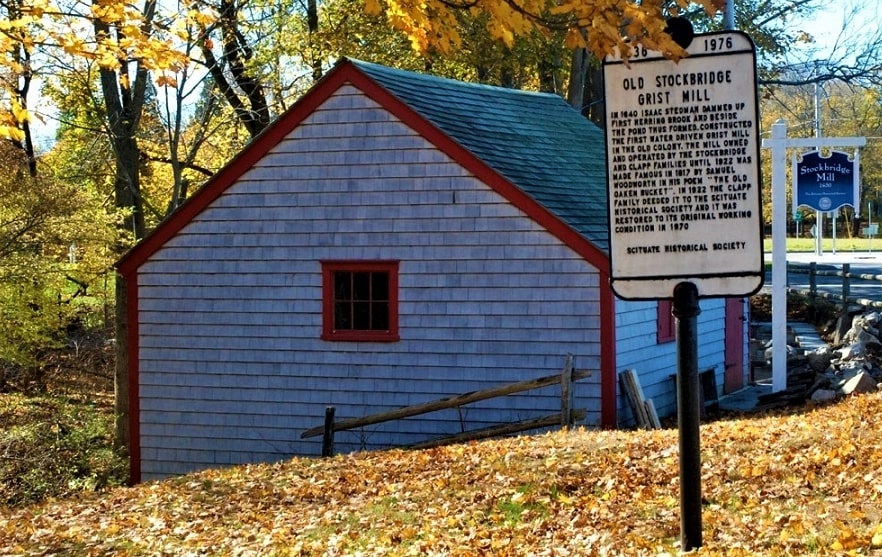
While Pratt was serving as president of the Scituate Historical Society he wrote a play, The Courtship of Arthur Howland, which was met with success. The Boston Herald reported that his play was staged as a benefit for the Historic Winslow House Association in 1924.
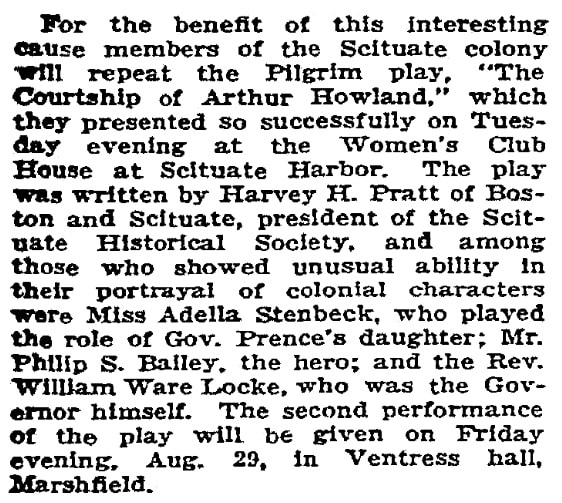
According to this article, among those who had star roles were: Adella Stenbeck (daughter of Henry Theodore Stenbeck and Mary Welthea Prouty, direct descendant of William White, Edward Doty, William Bradford, Edward Winslow, and Richard Warren) who played the role of Gov. Prence’s daughter; Philip Stanley Bailey, who played the role of the hero (Arthur Howland); and the Rev. William Ware Locke, who portrayed Governor Thomas Prence, Mayflower passenger.
In the play, Arthur Howland Jr., son of Arthur Howland and a nephew of Mayflower passenger John Howland, wished to marry Elizabeth Prence – and daddy Prence was not happy with the love match.
Howland’s attempt to pursue Prence was unlawful. The marriage laws referring to this can be found in Otto Erwin Keogel’s book, Common Law Marriage and Its Development in the United States (pp.57-60).
According to Alice Morse Earle’s story in the Union County Courier, Gov. Prence tried hard to put out Howland’s hot flame.
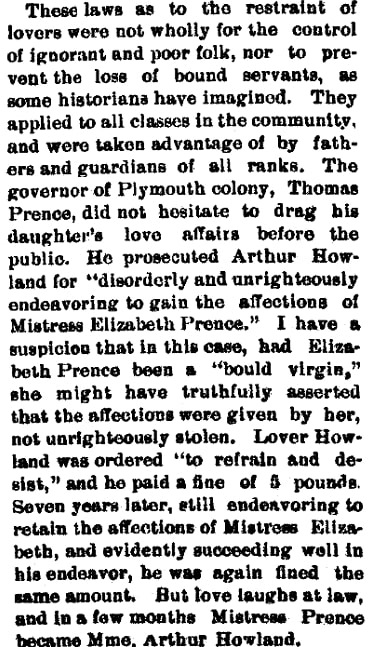
This article reported:
These laws as to the restraint of lovers were not wholly for the control of ignorant and poor folk, nor to prevent loss of bound servants, as some historians have imagined. They applied to all classes in the community, and were taken advantage of by fathers and guardians of all ranks.
The governor of Plymouth Colony, Thomas Prence, did not hesitate to drag his daughter’s love affairs before the public. He prosecuted Arthur Howland for “disorderly and unrighteously endeavoring to gain the affections of Mistress Elizabeth Prence.” I have a suspicion that in this case, had Elizabeth Prence been a “bould virgin,” she might have truthfully asserted that the affections were given by her, not unrighteously stolen. Lover Howland was ordered to “refrain and desist,” and he paid a fine of 5 pounds. Seven years later, still endeavoring to retain the affections of Mistress Elizabeth, and evidently succeeding well in his endeavor, he was again fined the same amount. But love laughs at law, and in a few months Mistress Prence became Mme. Arthur Howland.
There is much more to this story, and Pratt serves up the full dish in his book The Early Planters of Scituate; A History of the Town of Scituate, Massachusetts, from Its Establishment to the End of the Revolutionary War.
Apparently, the reason for Gov. Prence’s objection to the couple hitching up was not Howland’s lack of status, but his association with the Quaker faith. Pratt writes:
They were not “unfitt for marriage” within the meaning of this statute, both being of age and the former possessed of fifty acres of land in Duxbury which had been granted him by the colony court. There was however one grave and insuperable objection. Howland was a Quaker. His father, at first a sympathizer, had been frequently prosecuted before Prence, who was then Governor, for the entertainment of Quakers and assisting in the promulgation of their faith, and had finally embraced it. The Governor was rabid in his opposition to the sect and the marriage of his daughter to one of them was intolerable.
The young woman [Elizabeth Prence] was the third child of his [Thomas Prence] second marriage [to Apphia Quick]. Her mother was a sister of William Collier, as prominent and persistent in his persecution of the Quakers as was the Governor himself. Both parents forbade the courtship which in spite of their joint efforts continued.
When the reviews were published on his book The Early Planters of Scituate, most were favorable. However, the Patriot Ledger reported that one of the members of the Scituate Historical Society did criticize the book for being “too gossipy, not quite what she had expected, but nevertheless very entertaining.” Pratt did not write smut; his stories came from court records which can be quite spicy.
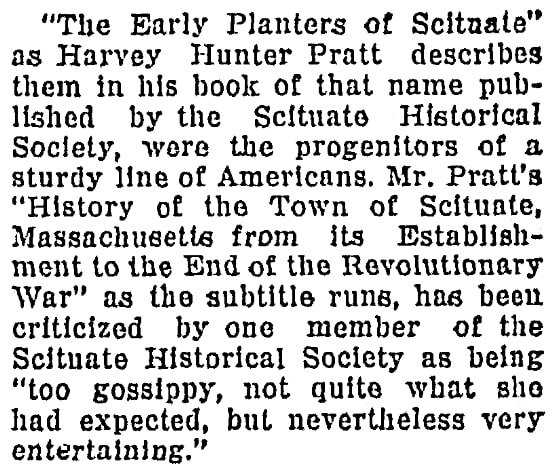
This article noted the many biographical sketches in Pratt’s book, which included a great deal of attention on the Cushing family line. A passage from his book is cited when referencing John Cushing, son of William Cushing and Nazreth Pitcher, who served in many important offices:
He [John Cushing] was the founder of a family of statesmen, patriots, judges, teachers, lawyers, and physicians, who in their respective generations have been prominent in widely settled communities especially in New England. His descendants have contributed to the best public thought and action of their times to a greater degree than probably any other Old Colony family, Standish, Alden, Winslow, and Bradford not excepted… In every field of endeavor where a descendant of John Cushing of Scituate has been placed, each has maintained a lofty standard; has been actuated by high ideals and has measured up well.
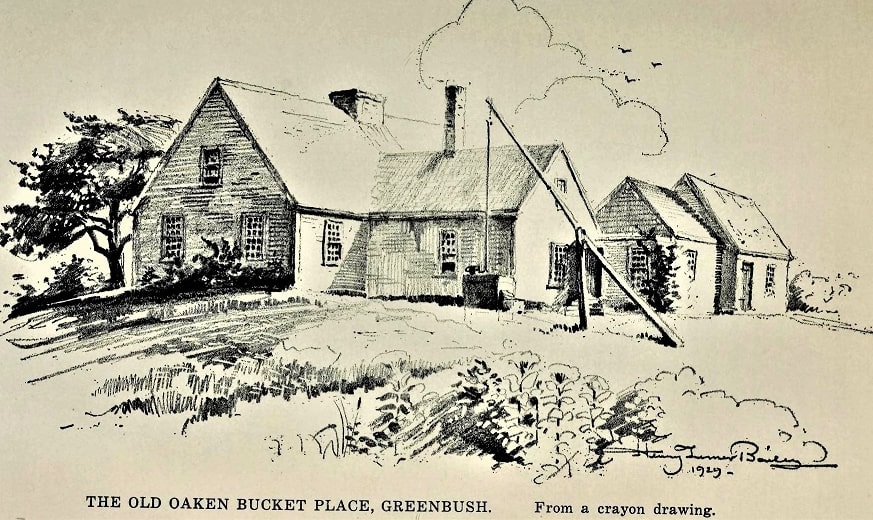
In 1920 Pratt served as chairman of the board of trustees for the Pilgrim Tercentenary celebration. One of the preparations he was involved with was the operation of an old grist mill built in 1640. It was the first water grist mill in the colony, located in the village of Greenbush. The plans for this undertaking were published in the Boston Herald, which gave the history of the mill site romanced in the poem “The Old Oaken Bucket” made famous by Woodworth.
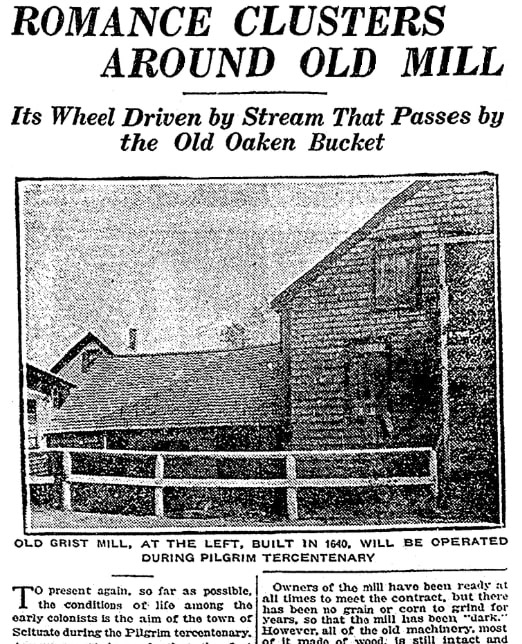
This article reported:
Present owners of the water grist mill are the descendants of Elijah Clapp, and they took the property subject to the duty of grinding all of the local corn brought them. The mill was built by Isaac Stedman and sold to a man named George Russell and then to Charles Stockbridge. Because of the latter’s long ownership, the mill has been known as the Stockbridge Mill.
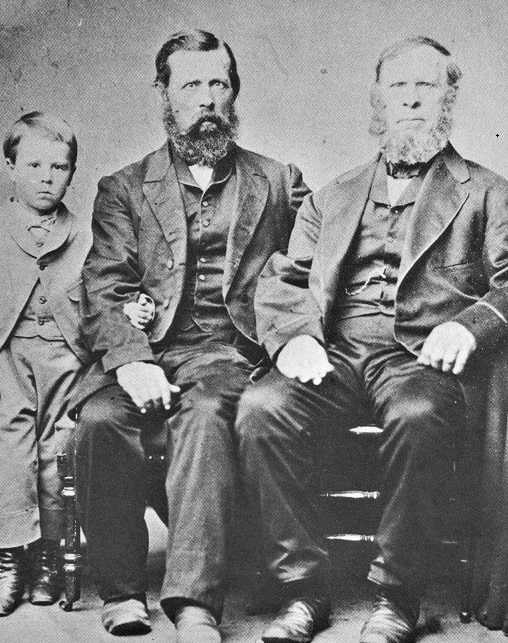
Note: In 1922 the Clapp family deeded the mill to the Scituate Historical Society, and it was restored to its original working condition in 1970.
Explore over 330 years of newspapers and historical records in GenealogyBank. Discover your family story! Start a 7-Day Free Trial.
Note on the header image: Harvey H. Pratt, from his book “The Early Planters of Scituate; A History of the Town of Scituate, Massachusetts, from Its Establishment to the End of the Revolutionary War.” Publication from the Scituate Historical Society and archive.org: https://archive.org/details/earlyplantersofs00prat/page/n19/mode/1up
Related Article:
